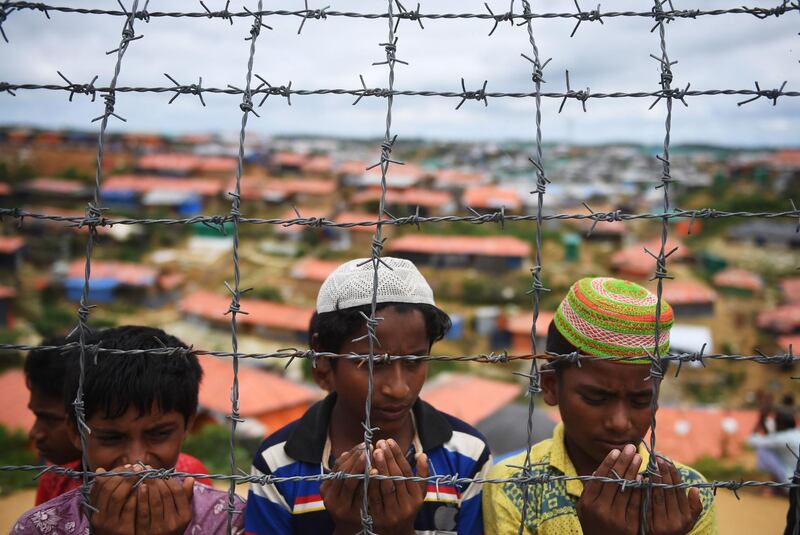Bangladesh has called on the international community to assist in ensuring the repatriation of the Rohingya by creating a safe zone in Myanmar.
Speaking at a panel event titled “The global compact on refugees” on Monday, Bangladesh’s prime minister Sheikh Hasina recalled her own experience of displacement while offering recommendations which would allow the Rohingya to return home.
“In Bangladesh, we are faced with the largest forced movement of over 1.1 million traumatised Rohingya at the shortest time. They have been forcibly displaced from their homes in Rakhine State of Myanmar where they had been living for centuries,” she said.
“We must not forget that every refugee deserves a safe return to their homeland. The displaced people from Myanmar must be able to return home with dignity, safety and security,” she added.
Ms Hasina said that by accepting the Rohingya into Bangladesh, her country had prevented the crisis from spilling out into the rest of the continent.
“I myself was a refugee once.”
— UNHCR, the UN Refugee Agency (@Refugees) September 24, 2018
Prime Minister Sheikh Hasina + her country of Bangladesh have opened their doors and their hearts to #Rohingya refugees.
Her statement at #UNGA underlines this personal sentiment.https://t.co/dAp4WCADAY pic.twitter.com/WzBnhh2wNC
Chairing the panel, the UN high commissioner for refugees Federico Grandi thanked Sheikh Hasini for sharing her own experience, which he said was a reminder that the event was “about people and not just about numbers and politics”.
Hundreds of thousands of Rohingya, a stateless Muslim minority in Myanmar, fled to Bangladesh after violence erupted with the country’s security forces in August 2017.
Myanmar’s powerful military generals have been accused by the UN of carrying out a “textbook example of ethnic cleansing” through their persecution of the Rohingya in Rakhine State.
Ms Hasina said Myanmar must abolish its discriminatory laws against the Rohingya, offer them pathway to citizenship and if needed create a “safe zone” inside the country to protect them.
She also said that Myanmar must accept the recommendations of a Fact-Finding Mission of the UN Human Rights Council last month, which said that military leaders should be held accountable for their crimes in Rakhine.
_______________
Read more:
Ground-breaking ruling triggers probe into Rohingya violence
UK to announce support for victims of sexual violence in Myanmar
_______________
The Bangladeshi leader’s comments came just hours after Myanmar’s commander in chief warned against foreign countries interfering in his country’s affairs.
Min Aung Hlaing said in remarks published by on his website on Monday that “talks to meddle in internal affairs” would cause “misunderstanding”.
The comments were the first time Min Aung Hlaing has spoken in public since the UN mission’s report called upon him and five other generals to be prosecuted for atrocities carried out last year, which include allegations of mass killings and gang rapes.
Myanmar denies wrongdoing says its forces carried out a legitimate operation to expel terrorists following attacks by Muslim militants on police and army posts.
The chief prosecutor of the international criminal court (ICC) announced last week that she was launching a preliminary investigation into the deportations of Rohingya into Bangladesh.
Also at the UN meeting, Turkey’s foreign minister Mevlut Cavusoglu urged developed countries to do more to assist with the numbers of refugees fleeing the conflict in Syria.
“Turkey is home to the largest refugee population in the world,” said Mr Cavusoglu, who stepped in at the meeting for President Tayyip Erdogan. “We have provided shelter to anyone needing protection. We have provided education, health, and psychological services to anyone who needs them.”
Mr Cavusoglu added that Turkey and Russia had a prevented a "huge tragedy" by agreeing to create a demilitarised buffer zone in Syria's Idlib province, which would separate government troops from rebel forces.





